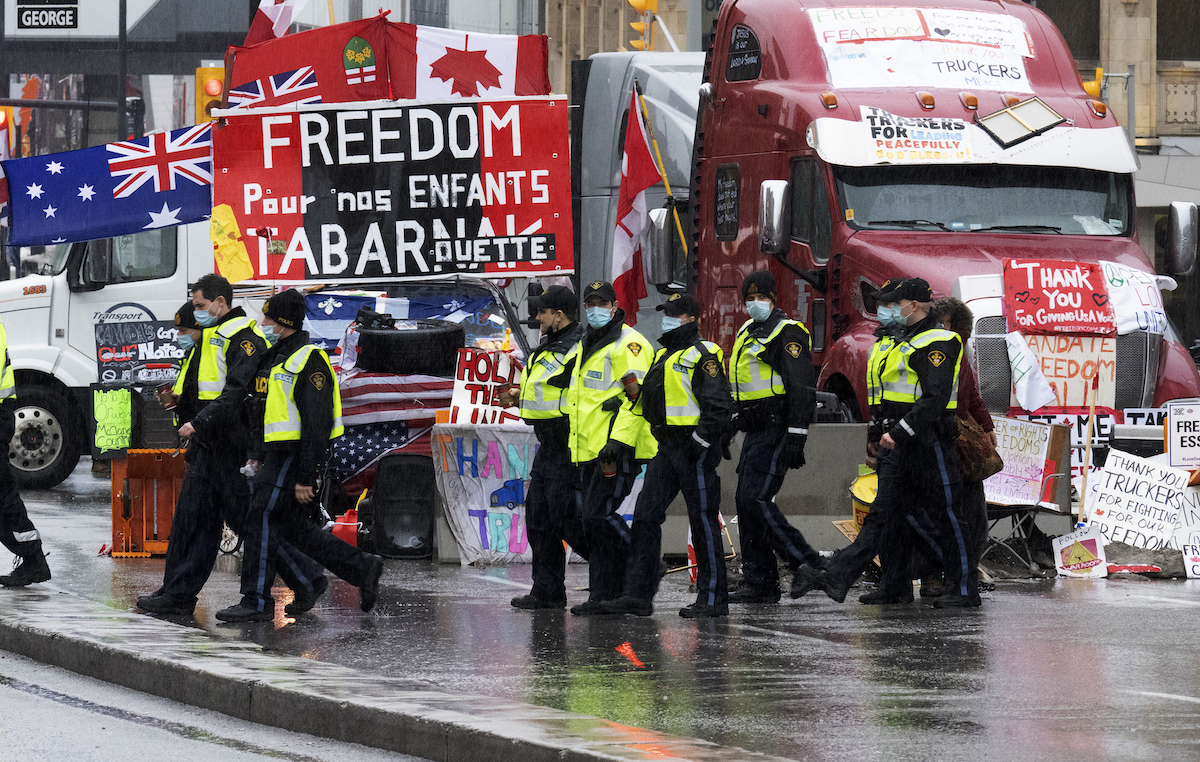The mask has been torn off. If anyone had any doubts that some governments will do literally anything to suppress anyone who protests what they regard as unreasonable measures by the state to address the COVID pandemic, events in Canada has surely disabused them of such illusions.
In times of war, we generally allow governments to do things we would never permit them to do in peacetime. But Canada, the last time I checked, was not at war with anyone. Indeed, it’s hard to imagine any government led by someone as earnestly woke and full of politically correct pieties as Prime Minister Justin Trudeau would go to war with anyone.
By invoking its Emergencies Act, however, the Canadian government has underscored the degree to which Western political leaders have been emboldened in their willingness to suspend basic human liberties in pursuit of their COVID policies—even to the extent of breaking into people’s bank accounts. The COVID pandemic has provided illiberal liberals with a new legislative tool—the opportunity to use special powers to suppress those who dispute their claims about what is necessary to combat COVID.
All this points to a broader question: How should we view the freedom to engage in peaceful protest and assembly? At what point do we say that a government is within its rights to disperse those who are doing things that inconvenience the rest of us, such as marching on highways, blocking traffic, or preventing people from going about their daily business? And when do we say that the government has gone too far?
Public protests can serve good purposes, especially when a grave issue of justice is involved. Many of the civil rights protests in the South during the 1960s played a major role in bringing the intrinsic injustice of segregation to the attention of other Americans and the world more generally. Likewise, the demonstrations of the Solidarity movement in Poland in the late 1970s and 1980s made the point to the entire world that Communist governments enjoyed no real legitimacy beyond the power of sheer force.
On the other hand, not all public protests have benign ends; sometimes they embrace despicable methods and can be easily manipulated by trained activists whose goals are often very different to those of the protesters. The burning down of businesses, looting, destruction of property, and violence against police officers upholding just laws that occurred all through America in 2020, for example, were not justifiable under any circumstances and merited forceful action by state authorities.
Determining how and when government authorities should act when faced with public protests, especially of the mass kind, inevitably involves a high degree of prudence on the part of state officials. Judging precisely when a peaceful march has turned into a very different affair is not as easy as it sounds. Excessive force can turn an otherwise peaceful exercise of the freedom of assembly into a riot. In other circumstances, failure by the authorities to act when a protest starts to turn ugly can embolden those whose primary interest is to engage in violence or steal or destroy other people’s property.
But prudence is simply mere pragmatism if it is not grounded in and guided by principles, or what might be called the rights and responsibilities of all people living in a society that seeks to be free and just, and which the state exists to uphold rather than destroy. That also involves government responses being proportionate to the scale of the protest and, therefore, neither insufficient nor excessive in nature and scope.
The case of the Canadian truckers provides us with a good way of thinking through these dilemmas. There’s no doubt that the mass protests against the government’s COVID policies have inconvenienced many people—including those who do business back and forth across the U.S.-Canadian border every day.
But inconvenience is not the same thing as violence. Nor is every inconvenience a threat to public order. Moreover, even many people who would describe themselves as liberal in their politics would agree that those protesting in Canada have a point vis-à-vis the Canadian government’s failure to acknowledge that its COVID policies have disproportionately affected those whose work cannot be done from a laptop at home.
To this we can add the fact that Justin Trudeau’s invoking of the Emergencies Act—legislation passed in 1988 designed primarily to deal with war, terrorism, violent insurrection, and direct threats to national security—is so obviously a disproportionate response to a movement that is not demanding anything essentially unreasonable or threatening to the national security of Canada. It effectively involves treating large numbers of Canadians as the equivalent of insurgents bent on violent revolution, which they plainly are not.
By that standard, we can say—as even the very liberal Canadian newspaper the Toronto Star has stated —the Trudeau government has reacted in a dramatically disproportionate way to the truckers’ protests. It speaks, according to the Star’s editorial page, to “a shocking admission of failure by governments at all levels.” There are many things that could have been done to avoid getting to this point but weren’t. That is another way of saying that government officials in Canada handled the protests unwisely and now have compounded their imprudence by using powers they should never have invoked in the first place.
The looming challenge for all of us who live in societies that purport to take liberty seriously is how we rein in governments that have become accustomed to behaving in ways that are, in the long term, inconsistent with the principles of a free society. You can be sure that large swathes of the political class will resist such an abatement of power. For once more power is acquired, few want to give it back. That, however, is all the more reason to ensure that spectacles like we see happening in Canada never occur again.
This article originally appeared in The Detroit News on Feb. 24, 2022
